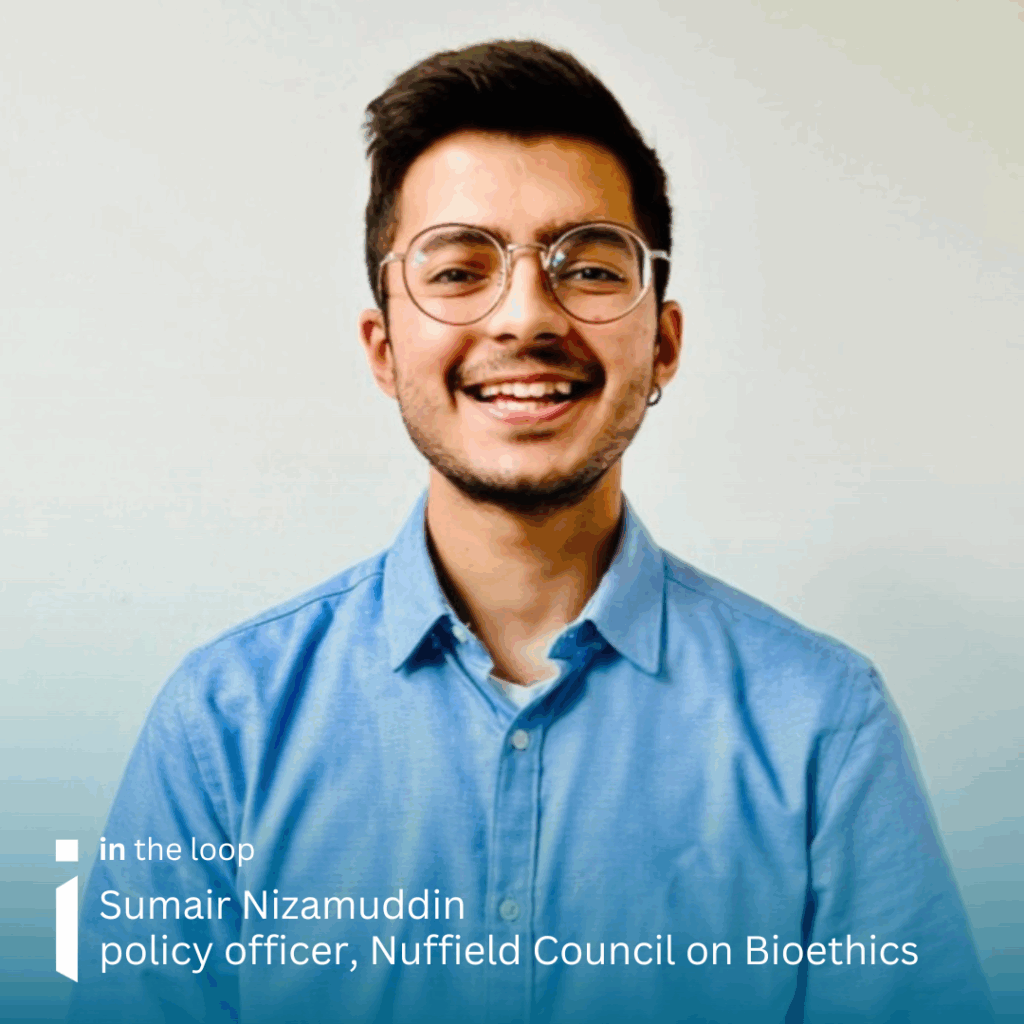Breaking the cycle: rebuilding trust in medical research and delivery
Interview with Sumair Nizamuddin, policy officer, Nuffield Council on Bioethics
(Sumair does not represent any of his employees in this interview/piece. Opinions are his own)
Estimated reading time: 9 minutes

Drawing on expertise in the social sciences as they relate to science and technology, Sumair Nizamuddin has worked extensively in understanding trust issues within medical and scientific fields. Sumair shares how to truly address longstanding issues of mistrust of healthcare and pharmaceutical processes within the global population, we need to delve further back in history to understand the colonial past
Sumair Nizamuddin has a rich background in public and patient engagement, particularly in healthcare and research. During his three-year tenure at Cancer Research UK, Sumair served multiple roles, including paediatric impact and engagement manager, focusing on improving clinical trial participation for young people and addressing healthcare inequalities. Currently, working at Nuffield Council on Bioethics, Sumair is a passionate advocate for interdisciplinary approaches to research, highlighting the need to involve diverse perspectives and community voices in scientific decision-making.
When it comes to looking at the issue of trust within a global health and pharmaceutical context, Sumair believes that what is missing is a deep understanding of historical context. An area where he feels little progress has been made.
Historical context matters.
Sumair believes the trust deficit between healthcare and pharmaceutical industries, and the general population is deeply rooted in a complex historical landscape of systematic medical racism and unethical research practices. As Sumair powerfully articulates, “We cannot avoid the fact—science and medical progress has a racist past. The medical research landscape has consistently marginalised vulnerable populations, conducting experiments without consent and using bodies of colour as experimental subjects.” Sumair points to the following book as important reference on this topic: Divided: Racism, Medicine and Why We Need to Decolonise Healthcare written byDr Annabel Sowemimo.
If we delve back to the colonial past, there is a disturbing legacy of unconsented medical experimentation on people of colour. This includes experimental surgical interventions such as gynaecological surgeries on enslaved women (often without anaesthesia), extraction of blood and tissue samples without consent and exposure to experimental drugs for human testing. But as Sumair explains, we don’t have to go back centuries to find examples of this. Recent history has its own examples of neo-colonial practices.
The Tuskegee Syphilis Study stands as one of the most egregious examples of medical racism in recent times. The study, conducted between 1932 and 1972 by the US Public Health Service, involved around 600 African American men—a mixture of those with latent syphilis and those without the disease. Participants lacked information regarding their health status and were ultimately denied support or access to adequate treatment.1 Records report that researchers deliberately withheld treatment in order to study disease progression—treating these men not as human beings, but as experimental subjects. Families were devastated and a community left traumatised by a study that viewed black bodies as disposable research material. The long-term consequences extend far beyond the immediate participants—such historical injustices reverberate through communities, shaping attitudes towards medical institutions for decades. Sumair directly addresses this historical blight, emphasising its deep-rooted impact on trust: “When we used extensively unconsented black people’s bodies for studying diseases and/or developing drugs, there’s an inevitable intergenerational lack of trust in medical and health systems.”
Citing a more recently example of medical racism, Sumair highlights persistent problematic attitudes within scientific research. During the Covid-19 pandemic, Sumair recalls hearing Jean-Paul Mira, head of intensive care at Cochin hospital in Paris, who suggested conducting vaccine trials in Africa, making deeply offensive comments about the continent’s populations. As Sumair recounts, “Jean-Paul Mira publicly proposed testing vaccines in Africa, stating that Africans ‘do not use any protection’, or they are ‘unhygienic’ and suggesting this population would be an ideal testing ground with minimal ethical concerns for Covid-19 vaccines. “If you are using this same narrative in 2020,” Sumair emphasises, “how do you expect people from that region, or with shared ancestry living in the UK or anywhere in the Western world, to have trust in the medical system?”
These abuses are scars contributing to generational mistrust of the medical system—from treating physicians to the entire ecosystem of science, research and drug development—so if we are to address issues of mistrust as Sumair states, “this historical context cannot be ignored”.
Contemporary challenges continue this problematic legacy, with clinical trials predominantly now designed around white, male populations. Sumair highlights the example of the Clopidogrel drug, which demonstrates the impact of this. When this drug was found to “fail miserably” when prescribed to South Asian populations questions were raised. Further studies found that a genetic difference rendered this medication less suitable for South Asians when compared to other demographics. Sumair reflects, “Repeated failures by industry to engage meaningfully with diverse communities means that opportunities to find these nuances are being missed at the discovery phase.”

Addressing mistrust: a comprehensive approach to rebuilding confidence
Sumair advocates for a fundamental shift in how medical research and healthcare engage with minority populations, emphasising that meaningful change requires a multi-faceted, deeply empathetic approach. The core of his recommendation is bringing a “historical and decolonial lens” to every conversation about trust and engagement. First and foremost, Sumair stresses the critical importance of interdisciplinary involvement. “We need people from social science backgrounds to also sit at that table,” he argues, highlighting that scientific solutions cannot be developed in isolation. This means actively involving social workers, community researchers and professionals who have direct experience working with marginalised communities.
Community engagement must be radically reimagined. Rather than expecting communities to come to us, Sumair insists we/the institutions must go to communities. This involves using multiple engagement strategies: involving community leaders and members, utilising local community centres and creating accessible communication methods. He provides a powerful example from his work at Nuffield Council on Bioethics, where they use art-based methods to help explain complex scientific concepts in public workshops, making information more approachable and understandable.
Training is another crucial area for transformation. Frontline healthcare workers need comprehensive education that goes beyond medical knowledge. This includes cultural competency training, understanding historical contexts of medical racism, and developing empathy for patients from diverse backgrounds. Sumair notes the current system fails because healthcare workers are often overwhelmed and lack the capacity to provide nuanced, compassionate care.
Representation must be genuine and meaningful. This means not just including diverse faces but truly giving voice and decision-making power to people from minority communities. “Are we involving community leaders and members? Are we involving the lay audience?” Sumair asks, emphasising that representation is about more than tokenism.
Communication strategies need complete overhaul. Research materials must be developed with linguistic and cultural accessibility in mind. Sumair highlights the need to create materials that can be understood by people with varying levels of digital literacy and educational backgrounds, along with open discussion of where their data is going to be used, to ensure accountability and transparency.
Practical approaches should include:
- developing communication materials in multiple languages
- creating community-specific engagement strategies
- implementing comprehensive cultural competency training
- establishing transparent research practices
- involving community members in research design from the earliest stages
“They are not hard to reach,” Sumair emphasises, “we just need to make our strategies smart enough that we reach them.” This powerful statement encapsulates Sumair’s core philosophy: the responsibility for building trust lies with medical and research institutions, not with marginalised communities themselves. The goal is to develop a system of research and healthcare that operates with genuine empathy, historical awareness and a commitment to addressing systemic inequities. It requires continuous self-reflection, willingness to acknowledge past wrongs and a proactive approach to creating meaningful, respectful engagement of the future.
Redesigning the future of medical research for and with the next generation
Sumair’s insights reveal a further critical imperative: the future of medical research depends on meaningfully engaging young people, particularly those from minority backgrounds. The current approach is fundamentally broken, with institutions repeatedly failing to create spaces where young people feel genuinely heard and represented. “Gen Z has a unique challenge,” Sumair explains, highlighting a paradoxical relationship with data. These young people are willing to share personal information on social media platforms like TikTok, yet remain deeply sceptical about sharing health information. Not unfounded, this mistrust is built upon generational perceptions passed down—the root of which lies in historical context.
The most significant failure lies in representation—or lack of, as Sumair shares. “The irony of discussions about young people’s trust are that typically these are occurring without a single young person in the room. When I’ve been in meetings discussing this, I’ve never seen a single young person on that table talking and being given the opportunity to share their views. This systemic exclusion perpetuates the very mistrust institutions claim they want to address.”

Clinical trials and medical research face particular challenges with teenage and young adult populations. There’s a critical gap between paediatric and adult research, with funding and interest dramatically dropping for the 16-22 age group. This demographic falls through institutional cracks, creating a generation that feels fundamentally unseen and unvalued by medical systems. Practical engagement requires the ability to radically rethink the approach to youth engagement as a whole.
Sumair advocates for platforms created specifically by and for young people, recognising that traditional communication channels are ineffective. This means developing research approaches that consider young people’s lived experiences—their educational commitments, mental health needs and practical and financial constraints. The approach must be holistic. Young people from minority backgrounds need to see themselves not just as research subjects, but as critical partners in medical advancement. This requires creating genuine pathways for input, decision-making and meaningful participation. Crucially, institutions must address the intergenerational trauma that shapes young people’s perceptions. The mistrust isn’t abstract—it’s a lived experience passed down through family histories of medical discrimination. “If we really do not bring that historical lens,” Sumair warns, “we lack in developing basic empathy for people we want to target.”
The stakes are high. Without meaningful engagement, medical research risks creating another generation of deeply sceptical individuals who view scientific institutions as inherently untrustworthy. The solution lies in genuine, transparent and respectful dialogue that centres young people’s experiences and perspectives while giving due recognition to the chequered past.
For Sumair, this is more than a research challenge—it’s a moral imperative. The future of medical research depends on our ability to listen, truly understand and create spaces where young minority voices are not just heard, but fundamentally shape the direction of scientific inquiry. “This is both a matter of personal and professional morals and ethics”, so we can move forward together in unity, toward a future of innovative scientific discovery that includes all citizens of the world.
Connect with Sumair
References
[1]. https://www.cdc.gov/tuskegee/about/index.html
in the loop lets you stay informed with all the latest issues from the world of RARE. To access more in the loop articles click below.

